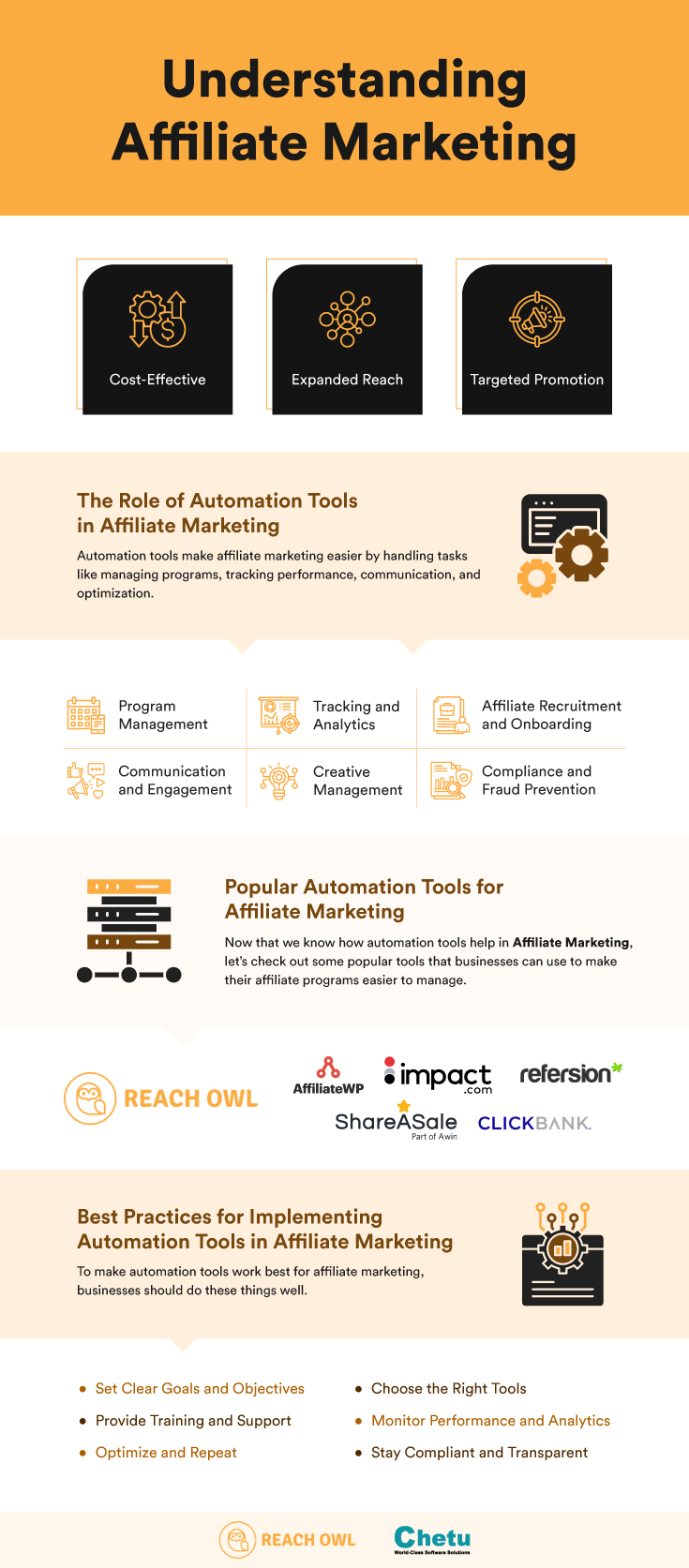Affiliate marketing helps businesses grow by reaching more people and selling more stuff. But it can be hard to handle all the tasks involved. That’s where automation tools come in handy. They make running affiliate programs easier and help businesses make more money.
In this blog, we’ll guide the role of automation tools in affiliate marketing, their benefits, popular tools, and best practices for implementation.
Table of Contents
ToggleUnderstanding Affiliate Marketing
Affiliate marketing is when businesses pay people (like bloggers or influencers) to bring customers to their website. They do this by using special links or promotions. These people, called affiliates, earn money for every customer they bring in. It’s like getting paid for helping a business get more customers.
Affiliate marketing offers several key benefits, including:
1. Cost-Effective:
Businesses only pay when they see results, making it a cost-effective marketing strategy.
2. Expanded Reach:
Affiliates help businesses tap into new audiences and markets.
3. Targeted Promotion:
Affiliates can target specific groups of people by offering special deals, which makes it more likely that those people will buy something.
Running affiliate programs, keeping track of how well they’re doing, and making them better can be hard if you don’t have the right tools and ways to do it. This is where automation tools play an important role.
The Role of Automation Tools in Affiliate Marketing
Automation tools make affiliate marketing easier by handling tasks like managing programs, tracking performance, communication, and optimization.
Here’s how automation tools enhance the efficiency and effectiveness of affiliate marketing campaigns:

1. Program Management:
Automation tools make it easier to handle affiliate programs. They gather everything in one place, like signing up affiliates, checking how well they do, and paying them. These tools do routine tasks like approving affiliates, commission calculations, and sending payments automatically. They help businesses save time tracking software and effort.
2. Tracking and Analytics:
Automation tools help businesses tracking and analytics how well their affiliates are doing, see if their promotions are working, and figure out what changes might help.
These tools track important numbers like clicks, conversions, and how much money is made. By using this data, businesses can make driven decisions and improve their affiliate marketing strategies.
3. Affiliate Recruitment and Onboarding:
Automation tools or automated resume software help businesses screen and recruit easily. These tools let companies make their own sign-up forms, set up automatic approval steps, and give personalized experiences to new affiliates. This helps businesses grow their affiliate programs faster and get good affiliates who match their brand and audience.
4. Communication and Engagement:
Automation tools help businesses communicate and engage easily with their partners (called affiliates). They use emails, newsletters, and messages that are sent automatically. These tools let affiliates know about changes in programs, chances to promote things, and how well they’re doing.
5. Creative Management:
Automation tools make it easier to make, share, and keep track of ads like banners and links. They have easy-to-use screens for creating and changing ads, along with features for testing, improving, and seeing how well the ads are doing.
6. Compliance and Fraud Prevention:
Marketing Automation tools help businesses follow rules, watch over affiliate actions, and stop bad behavior like fake clicks or unauthorized ads. They have fraud detectors, live dashboards, and custom rules to keep businesses safe from harm.
Popular Automation Tools for Affiliate Marketing
Now that we know how automation tools help in affiliate marketing, let’s check out some popular tools that businesses can use to make their affiliate programs easier to manage:
1. ReachOwl:
ReachOwl automation tools help affiliate marketers by automating tasks such as tracking, reporting, and improving campaigns automatically. It affiliate recruitment, management, and payouts, making it easier to onboard affiliates, track performance, and ensure timely payments. Click the link to visit the website: https://reachowl.com/

2. AffiliateWP:
AffiliateWP is a tool for WordPress websites that helps businesses set up and run affiliate programs. With it, you can track affiliates, see reports, and manage commissions easily. It also works well with popular online stores and payment systems.

3. Refersion:
Refersion is a cloud-based affiliate marketing platform that helps online stores with their affiliate marketing. It makes it easy to run affiliate programs by keeping track of sales, offering different ways to pay commissions, and connecting with popular online store systems like Shopify and WooCommerce.

4. Impact:
Impact is a big tool for companies to do affiliate marketing. It helps them find affiliates, track their work, and make it better. It also gives reports and analysis. Impact helps with influencer marketing and forming partnerships too.

5. ShareASale:
ShareASale is one of the largest affiliate marketing networks. It helps businesses work with lots of affiliates in different fields. They have an easy-to-use website and good tools for tracking sales. Merchants and affiliates both get helpful resources from ShareASale.

6. ClickBank:
ClickBank is a global affiliate marketplace where people sell digital stuff like ebooks or software. They also get other people to help sell these things, called affiliates. ClickBank lets sellers decide how much money they want to give affiliates for helping them sell stuff. It also helps keep track of who sells what and pays the affiliates.

Best Practices for Implementing Automation Tools in Affiliate Marketing
To make automation tools work best for affiliate marketing, businesses should do these things well:
1. Set Clear Goals and Objectives:
Set clear goals for your affiliate marketing, such as increasing sales, reaching more people, or getting more visitors to your website. Make sure your automation plans match these goals so you get the best results.
2. Choose the Right Tools:
Choose automation tools that fit your business’s needs, budget, and technical requirements. Think about factors such as how easy they are to use, if they can grow with your business, if they work with other tools you use, and if you can get help if you need it.
3. Provide Training and Support:
Help your partners learn how to use automation tools well. Give them training and support. Offer resources and tutorials to show them how to do things best. This helps them do better and succeed more.
4. Monitor Performance and Analytics:
Keep checking how well your affiliate marketing is doing by looking at important affiliate marketing campaigns. Use what you learn to see what’s working, what’s not, and how you can do better. Look for patterns in the data, try new ideas, and make informed decisions to get better outcomes.
5. Optimize and Repeat:
Keep making your affiliate marketing better by looking at how well it’s doing and getting feedback from affiliates. Try out new things, such as different ideas, pictures, and ways to promote stuff, to identify what gets the best results for your audience and goals.
6. Stay Compliant and Transparent:
Follow the rules for affiliate marketing set by organizations. Make sure your terms and conditions are easy to understand. Always do business in a fair and honest way to build trust and credibility with your audience.
Automation tools help businesses with affiliate marketing. They make tasks easier by managing programs, tracking data, recruiting affiliates, communicating, managing creativity, and preventing fraud. Using automation tools and good strategies can help you succeed in affiliate marketing and grow your business.

